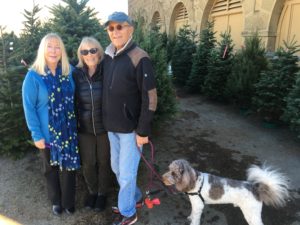
Benicia Historical Museum Director Elizabeth d’Huart (Far left) poses with (Left to right) Benicia couple Robin and Mark Hajjar as well as their dog Splash as they browse for trees at the museum’s annual Christmas Tree Lot Fundraiser. Proceeds benefit the museum and Vallejo’s Genesis House. (Photo by Nick Sestanovich)
The past 10 years have been difficult for tree farmers, especially on the West Coast. They have had to deal with droughts, fires and an overall shortage. Nonetheless, the Benicia Historical Museum has managed to soldier on, selling sustainably farmed Christmas trees at affordable prices with the proceeds benefiting two local nonprofits for the eighth year in a row.
The first Christmas Tree Lot Fundraiser was held in 2010 with the proceeds going to two beneficiaries: the museum itself and Genesis House, a Vallejo-based nonprofit organization which was founded in 1972 to help provide treatment to men and women experiencing substance abuse. The fundraiser has been a success year after year.
That is not to say there have not been challenges along the way. Elizabeth d’Huart, the museum’s executive director, said she had seen national coverage of the live tree shortage for the first time in a long time this year. Like a lot of trades that year, the live tree industry experienced an economic crisis in 2008. A lot of tree farms had overplanted their trees, resulting in the prices going down and several farms failing.
“There was a Christmas tree glut on the market,” d’Huart said. “A lot of those farms failed and weren’t replaced, and those trees weren’t replanted.”
Additionally, the fir-heavy states of California, Oregon and North Carolina experienced long periods of drought. Other factors impacting Christmas trees include a pest problem and the fires that scalded California in October. Finally, consumers are demanding more trees than farms are able to supply.
“A lot of tree farms are now so inundated with orders, they can’t supply everybody,” d’Huart said.
Despite all that, the Benicia Historical Museum has been able to keep the tradition going.
“We feel very fortunate that we have been able to get the trees that we have and, of course, the usual mix which includes the noble fir, the Douglas fir and the Nordmann fir,” d’Huart said.
As always, the trees are sustainably farmed and sourced from Noble Mountain Tree Farm in Salem, Ore. and range in size from 2 to 10 feet. The trees are certified by the Society of Environmentally Responsible Facilities (SERF), which d’Huart says have a lot of benefits.
“Noble Mountain supports a balanced economic, social and environmentally sustainable operation,” she said. “The farm has a sustainability plan which details activities in five performance areas: biodiversity, soil and water resources, integrated pest management, health and safety, and consumer relations, e.g., fostering farm stewardship and environmental education.”
D’Huart also said the live tree industry employs more than 100,000 people in America. She also noted that buying Christmas trees from the museum has a lot of advantages over purchasing from box stores, including a large parking lot, people in the lot who can assist with selecting trees as well as placing them on top of the cars and delivering them locally.
The lot also is continuing to provide activities and items for children, including candy canes, coloring books and Charlie Brown-style bonsais that can be made beautiful with a little tender loving care. Cally the Carousel Camel is also back to deliver children’s letters to Santa, which parents can view by request if they need to see their child’s wishlist.
Patrons are also encouraged to visit the museum’s revamped gift shop where people can purchase camel ornaments as well as trivets and coasters based on Guillermo Wagner Granizo’s tile artwork. D’Huart said the items were unveiled at Wednesday’s Economic Development Board meeting.
“(They) received a really enthusiastic response from those board members because they are quite high quality, very attractive and would make great Christmas presents,” she said.
D’Huart said the museum is paying more for the trees, but the prices have not been increased proportionally so they remain a bargain. She also added that the funds are going toward a good cause.
“It’s a quality product, but it’s also benefiting two extremely important nonprofits,” she said. “(It’s) a true community enterprise.”
The lot will be open daily from 10 a.m. to 7 p.m., through Dec. 22 at the Benicia Historical Museum, located at 2060 Camel Road. The lot will close if trees are sold out earlier. For more information, call the museum at 745-5435.






Leave a Reply